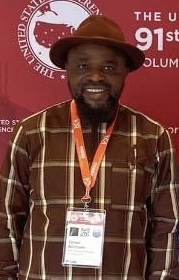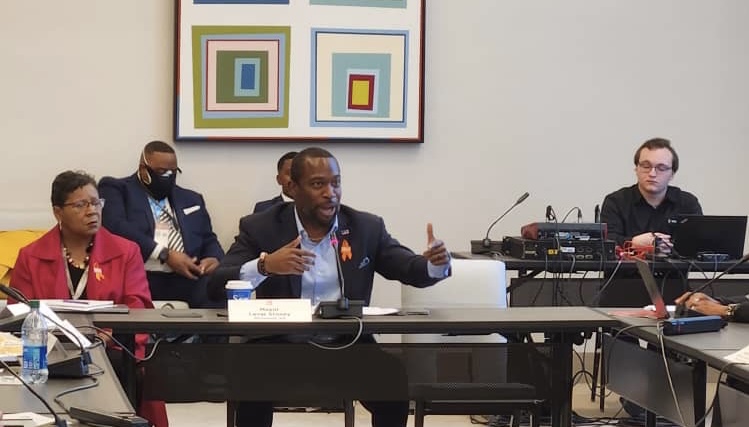By Taiwo Akinlami

The session, which was shared by Levar M. Stoney Mayor of Richmond, VA focused on addressing two thematic areas for resolution, namely ‘Lung Cancer Screenings’ and ‘Why Early Childhood? The Science and The Economic Case.’
The proceedings aimed at creating awareness about the state of the health of children and education (and related issues like the education of children, particularly early childhood education), general health issues and human services across the United States of America and the inevitable roles of mayors in improving the same also provided the rare platforms for them to share ideas, experiences, gaps and achievements in the pursuit of holistic programs relating to the concerns of the committee in their cities and communities.

The session, which lasted for an hour, began with opening remarks from Mayor Levar M. Stoney, welcoming his fellow mayors, observers and members of the press. He noted the purpose of the proceedings and encouraged meaningful contributions from the members of the committee and other observers, which can help the proceedings achieve its objectives.
The first presentation on Lung Cancer Screenings was by Maya Sharma, National Director, American Lung Cancer Screening Initiative and Researcher, Harvard Medical School, Laboratory of Dr. Chi-Fu Jeffrey Yang.
Maya Sharma is not new to addressing this kind of proceedings, apart from co-drafting the US Senate Resolution (passed unanimously) recognizing lung cancer awareness month, she is spearheading American Lung Cancer Screening Initiative mayoral and State outreach campaigns. Her presentation, which was passionately and convincingly delivered, focused on early detection of lung cancer as the most viable solution to the management and cure of the same.
She pointed out that regular screening holds the key to early detection. She noted that lung cancer is the leading cause of cancer related death in the United States, causing more deaths each year than breast, colon, and prostate cancer combined. She further announced that statistics show that in 2023, 130,000 Americans will die of lung cancer, noting that 48% of cases are detected at late stage, which is a large contributor to mortality.
Ms. Sharma informed that the best way to detect lung cancer as demonstrated by large clinical trials is the Low-Dose CT Lung Cancer Screening and noted that according to the United States Preventive Services Task Force, the eligibility criteria for lung cancer screening include persons of 50-80 years, 20+ pack smoking history and current smokers or those who quit within the last 15 years. She further stated that only 5.8% of eligible Americans are being screened for lung cancer, compared to the rates of breast, cervical and colon cancer screenings, which are73%, 82% and 67%, respectively and informed that awareness is a huge problem as 84% of Americans do not know lung cancer screening exist.
She also brought a unique perspective about racial and ethnic disparities to her presentation, noting that Black Americans are 3 times less likely to be screened for lung cancer and more likely to develop and die from lung cancer than any other racial or ethnic group and that black men have the highest death rate from lung cancer in the United States. She concluded that Hispanic Americans are 7 times less likely to be screened for lung cancer.
Her very enlightening session was received with very sober reflection with committee members voicing their commitment to prioritize creating awareness for early lung cancer screening for the eligible groups in their cities and communities.
The second presentation was by Ann Hentschel, Director of Early Learning, the Hunt Institute. Established in 2001, The Hunt Institute honors the legacy of James B. Hunt, Jr., the former governor of North Carolina who distinguished himself as an ardent champion of education.The Institute brings together people and resources to inspire and inform elected officials and policymakers about key issues in education, resulting in visionary leaders who are prepared to take strategic action for greater educational outcomes and student success.
The foregoing mission of the institute set the tone for the presentation of Hentschel, which was titled, ‘Why Early Childhood? The Science and The Economic Case.’ In a presentation, which lasted for about 15 minutes, she noted that children grow faster than we think as parents and policy makers. She depicted her assertion with the drawings of neural connections in the human brain from Harvard Center on the Developing Child of the brain of a child at birth , three months and at thirteen months, noting that by the time a child is thirteen months, huge development has already taken place. Therefore, nothing about the child’s development can be left to chance from birth.
She informed that the first five years in the life of a child is very critical to the total and lifetime wellbeing of the child. Making a strong economic case for early childhood she identified major indices for the rate of return to investment in Human Capital. She identified the positive returns on investment to include full-time employment, increase in graduation rates, tax-paying ability, improved heath outcomes and economic earnings while she pointed out the negative returns on investment to include incarceration, need for social services, suspension rates and criminal activities.
She noted that lack of adequate investment in early childhood has led to major productivity challenges, as she shared the READYNATION report of February 2023, which showed that a whopping $122 Billion is calculated as the growing, annual cost of the infant-toddler childcare crisis in the United States. The report, according to her presentation further stated that the impact on families, businesses and taxpayers has more than doubled since 2018.
She concluded her insightful presentation with a call to immediate action and expressing the readiness of her organization to work with the members of the committee to strategically address the infant-toddler childcare crisisin their cities and communities.
Mayor Levar M. Stoney commended both presentations and welcomed contributions from the members of the committee. Sharing his experience as someone who was born to two young people, her mum being 16 and her dad, 18 and raised by her grandmother, who was in her late 50s, he emphasized the roles of the family in addressing the infant-toddler childcare crisis and expressed the needfor a deliberate and intensified strategic efforts to strengthen the family institution to enable it play its pivotal roles in addressing and finding lasting solutions tothe costly crisis.
The session ended with members and observers exchanging pleasantries and the chair making relevant closing announcements.
Support the New Americans magazine to continue to serve our community with precise news that affect the new American, immigrant and refugee community. https://paypal.com/donate/?hosted_button_id=8LHFS78NRNJJY&source=

































Leave a Reply
You must be logged in to post a comment.